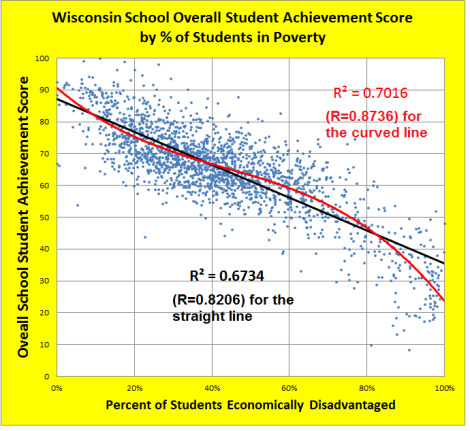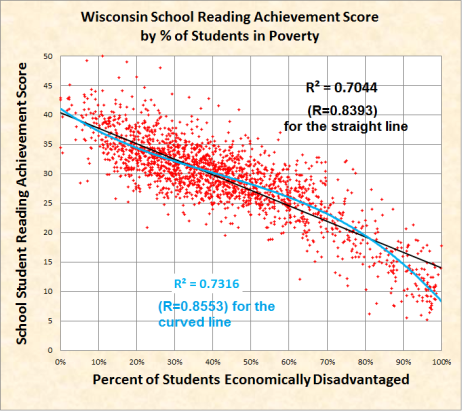Quite a few Ed Deformers say that Poverty Isn’t Destiny. They say that it doesn’t matter if a child has been subjected to lead poisoning, separation from parents, violent or otherwise cruel child abuse, inadequate nutrition, and has lacked dental or health care and the love and care of a family during the first, crucial years. All it takes is for a Bright Young Thing fresh out of college to work her butt off for two years before she goes to work for a bank — and all of those handicaps will be overcome, with no extra dollars invested, and maybe even less!
Or maybe not.
Lots of teachers have been working their butts off for many decades, doing their best, believe it or not (for the most part).
Here are two three graphs from Wisconsin that show how close the connection between the poverty rates and student achievement levels, at all of their schools for which they provide data. My data come from here and are for SY 2011-2012. In fact, you can download the entire spreadsheet for the state of Wisconsin if you click on this link:
http:reportcards.dpi.wi.gov/files/reportcards/xls/2011-12reportcarddata.xlsx
In both all three graphs, the percentage of students at the schools is along the horizontal (X) axis. In the first two, the average achievement score at the school is along the vertical (Y) axis.
In this first graph, Wisconsin uses a 100-point scale for overall student achievement.
That is an incredibly strong correlation between poverty levels and student achievement. The fewer the proportion of poor students at a school, the better the achievement scores at that school.
I had Excel compute two correlation “trend” lines – one straight, in black, and one curved, in red following a third-degree polynomial, since it looks like we have a serious “Matthew effect” going on here. In either case, the R-squared and R values are very elevated, showing that, in fact, poverty is in fact destiny for a lot of kids.
The next graph is for reading only, but it shows essentially the same trend. School reading scores go from 0 to 50.
There are very few real-life correlations between two entities stronger than what you see in these two graphs.
This next graph is a little different, for two reasons: the y-axis is math, and it’s the percent of students deemed ‘proficient’ on whatever test Wisconsin is using. It also shows a very strong correlation.



Well, this is going to be ignored by a lot of people. 🙂
LikeLike
In Massachusetts our high-stakes test is called the “zip-code” test by many teachers. If scores were correlated by family income the effect would be at least as strong as the effect in your graphs.
I knew I was a “good” teacher because I had “good” students. I tried very hard to not take too much credit or too much blame. I just tried to teach effectively to all my kids.
LikeLike
The important thing is in presentation–poverty (the correlate) is not the cause per se, rather it is a series of other intervening variables. The problem comes when we are accused of saying, “She can’t succeed because she is poor.” The truth is, “Because she is poor, she has been subjected to lead poisoning, separation from parents, violent or otherwise cruel child abuse, inadequate nutrition, and has lacked dental and health care and the love and care of a family during the first, crucial years, and this neglect has had substantive impacts on her physically and intellectually, and that is getting in the way of her ability to succeed on standardized tests.” Quite a mouth full, but at least it focuses on issues we can tackle. We may never eliminate poverty, but we CAN make sure children have adequate health care, strengthen families and parenting skills, improve nutrition, reduce exposure to lead (and mercury, and other toxins), and deal with other indicators associated with poverty. Poor children (and any other label you want to use) CAN and DO (and WILL) learn, and they will do so more successfully if we can implement policies that address the real life outcomes of poverty.
LikeLike
I suspect many of the effects we both mentioned are so pernicious, and so deadly, that those who have suffered them are indeed scarred for life. Some repair is possible, but the child will never achieve what he/she could have done without those impairments.
You are quite right, we need to work on remedying those terrible effects of poverty. To pretend that “excellent teachers” fresh out of college with no life experience and no training will turn it all around is utterly ludicrous.
LikeLike
It’s still a problem that the laws in the US assume that this correlation doesn’t exist. That’s why threatening to defund schools with poor test scores doesn’t actually make their test scores improve. A lot of those schools can’t just be tested out of poverty – there are child and family variables unrelated to the school and teacher quality that matters. There is actually a strong link between poverty and “school readiness” factors from before they even step their foot into the door (eg. language and social development factors). There are also motivation factors if the poor kids don’t actually expect to ever graduate from high school, so they aren’t necessarily motivated to care about either school or the test. and other things.
LikeLike
The book How Children Succeed, by Paul Tough (available in the iBook store & other places) has a lot of good discussion of studies about how the stresses that poverty puts on children affects their brains & ability to do well in school. The good news from these studies is that good parenting can do a LOT to counteract the affects of these stresses.
Of course, there is still the problem of helping parents (e.g., teen moms) who did not grow up with good parental role models develop good parenting skills. But the studies show that poverty does not have to be destiny for all poor children.
The bad news you already know; that is that it is much easier to get political support for high-stakes testing, naively believe that all children can meet the standards if the teachers would just “do what they are supposed to do” and then blame the schools for the kids’ low scores.
LikeLike
This article is a good start but doesn’t go far enough. Educators need to start citing to brain research and how poverty hurts the developing brain.
LikeLike
[…] Poverty Isn’t Destiny? […]
LikeLike
Here’s another 2009 study that comes to the same conclusion: http://www.k12center.org/rsc/pdf/BetebennerandLinnPresenterSession1.pdf… it was ignored… SOMEDAY we’ll abandon the notion that time needs to be fixed and student performance is variable… Ron Edmunds advocated this in the 90s and it’s been ignored as well… it seems we’d need to abandon the bell curve and move toward mastery learning to make this a reality…
LikeLike
Thank you for these excellent charts, charts we all have seen too often. As a retired Dallas inner-city middle school teacher I’ve battled this for a long time. In 2005 we started a project to help students begin to envision graduating and their own future, a time-capsule project, now started with letters from their parents as to the parental dreams for the child’s future, involves students writing letters to themselves as to what they hope to be doing in 10 years, and how they will get there. Both letters go together into one envelope, self-addressed (with several extra addresses of relatives to help locate students in 10 years), and then placed into a 500-pound vault bolted to the floor in a central location in the school lobby, hopefully under spotlights. It sends a message of the future connection every day as students pass it. The high school graduation rate has gone from 33% for the Class of 2006 to 65% for the Class of 2012! Yes, a dynamic principal was a major factor,but we are on the way to a solid 80% graduation rate for an inner-city school! That is the power of dreams for the future. Students know that at their 10 year reunion they will be invited to speak with then current students about their recommendations for success. They are warned to prepare for questions like: “What would you do differently if you were 13 again?” The first reunion will happen in November of 2014. See http://www.studentmotivation.org and the attached blog.
LikeLike
[…] and retired math teacher G.F. Brandenburg deciphers the central claim of the corporate reform movement: Does poverty matter? Is it destiny? Can a young teacher with a […]
LikeLike
Anyone who reads the newspaper knows about the close correlation between poverty and school achievement. That said, we should never use the phrase “poverty is destiny” because of its potential to discourage young people who are fighting to overcome their financial hardships. Also, the word “destiny” inplies futility and we have only to read the biographies of many famous people to know that poverty can be overcome and often is overcome by determined individuals. Sonia Sotomayor’s newly released autobiography is testament to that.
Yes, many children is poverty suffer barriers that are often difficult, almost impossible,to overcome. Until we face this fact, and do something about it, we won’t see much of an educational improvement for our least advantaged children. Still, we must give them hope and the first thing we can do is to p phrases that imply hopelessness.
LikeLike
Corrections:
many children in poverty
.the first thing we can do is to drop phrases…
Sorry, I forgot to edit.
LikeLike
Accordingly to the “educrats” the primary cause to poor educational outcomes is poor teachers.Therefore, the only logical answer to this enigma of poor educational outcomes correlating with poverty is that the teachers in low income areas must be “poor” teachers!
And, the way to cure the problem is by eliminating tenure, instituting merit pay and privatization of public education!
Walt Sautter
Example Stickies:http://teachersdontsuck.blogspot.com/
LikeLike
[…] who claim “poverty isn’t destiny” and “poverty is no excuse” are often those who have failed in their responsibility to […]
LikeLike